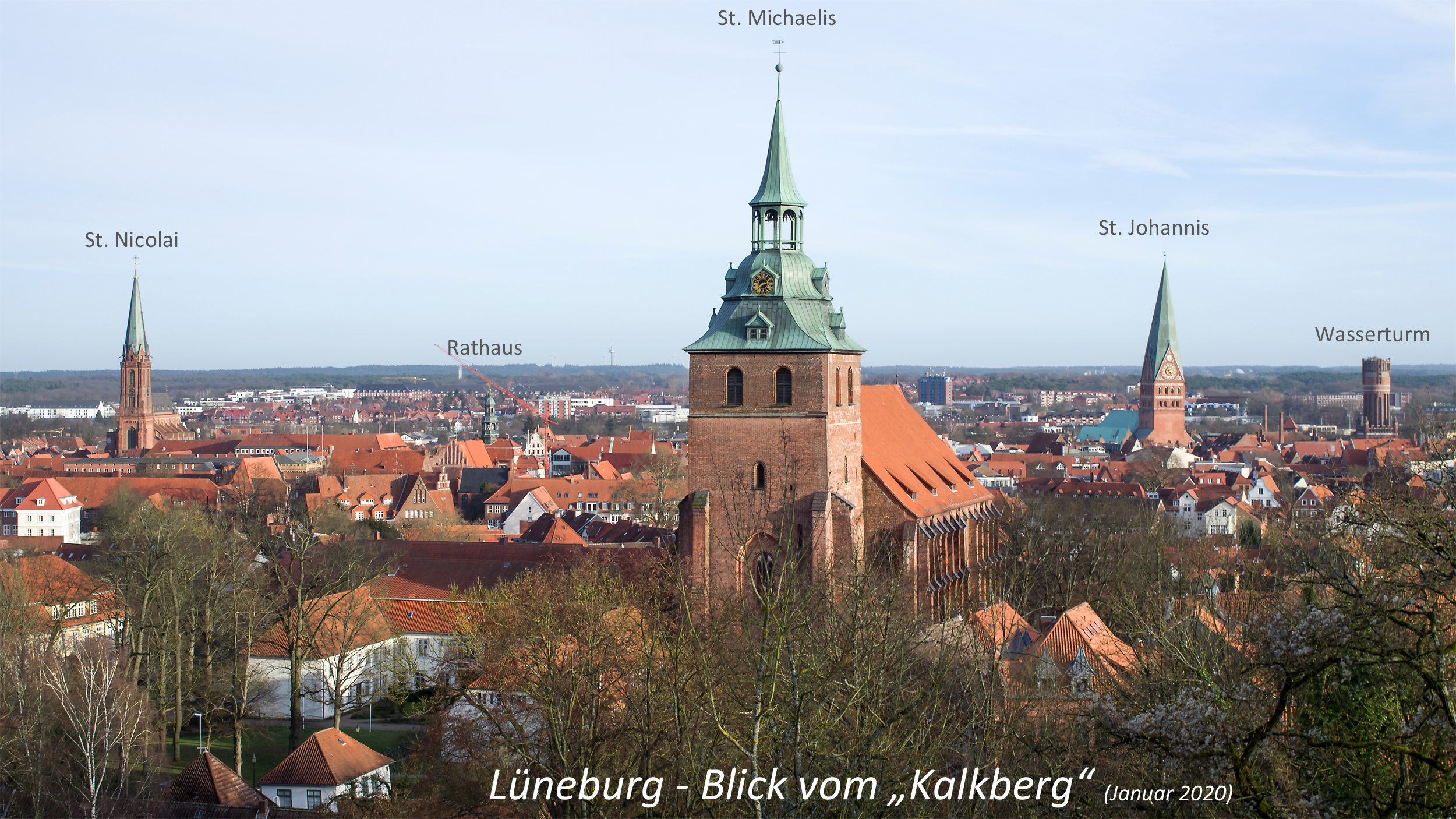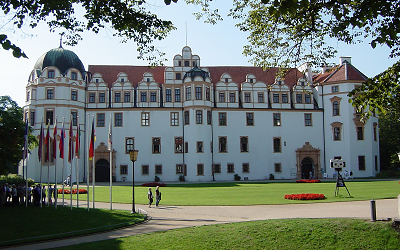|
History Of Hanover
Hanover () is a territory that was at various times a principality within the Holy Roman Empire, an Electorate within the same, an independent Kingdom, and a subordinate Province within the Kingdom of Prussia. The territory was named after its capital, the city of Hanover, which was the principal town of the region from 1636. In contemporary usage, the name is used only for the city. Most of the historical territory of Hanover forms the greater part of the German state of Lower Saxony but excludes certain areas. Formation Hanover was formed by the union of several dynastic divisions of the Duchy of Brunswick-Lüneburg, with the sole exception of Brunswick-Wolfenbüttel. From 1714 to 1837, it was joined in a personal union with the United Kingdom, which terminated upon the accession in Britain of Queen Victoria, as in Hanover, a woman could not rule if there was a male descendant. Until 1803, when it was occupied by French and Prussian troops, Hanover was a constituent state ... [...More Info...] [...Related Items...] OR: [Wikipedia] [Google] [Baidu] |
Holy Roman Empire
The Holy Roman Empire, also known as the Holy Roman Empire of the German Nation after 1512, was a polity in Central and Western Europe, usually headed by the Holy Roman Emperor. It developed in the Early Middle Ages, and lasted for a millennium until its Dissolution of the Holy Roman Empire, dissolution in 1806 during the Napoleonic Wars. For most of its history the Empire comprised the entirety of the modern countries of Germany, Czechia, Austria, the Netherlands, Belgium, Switzerland, Slovenia, and Luxembourg, most of north-central Italy, and large parts of modern-day east France and west Poland. On 25 December 800, Pope Leo III crowned the Frankish king Charlemagne Roman emperor, reviving the title more than three centuries after the fall of the Western Roman Empire in 476. The title lapsed in 924, but was revived in 962 when Otto I, OttoI was crowned emperor by Pope John XII, as Charlemagne's and the Carolingian Empire's successor. From 962 until the 12th century, the empire ... [...More Info...] [...Related Items...] OR: [Wikipedia] [Google] [Baidu] |
Lüneburg
Lüneburg, officially the Hanseatic City of Lüneburg and also known in English as Lunenburg, is a town in the German Bundesland (Germany), state of Lower Saxony. It is located about southeast of another Hanseatic League, Hanseatic city, Hamburg, and belongs to that city's wider Hamburg Metropolitan Region, metropolitan region. The capital (political), capital of the Lüneburg (district), district which bears its name, it is home to roughly 77,000 people. Lüneburg's urban area, which includes the surrounding communities of Adendorf, Bardowick, Barendorf and Reppenstedt, has a population of around 103,000. Lüneburg has been allowed to use the title ('Hanseatic Town') in its name since 2007, in recognition of its membership in the former Hanseatic League. Lüneburg is also home to Leuphana University of Lüneburg, Leuphana University. History ImageSize = width:1050 height:100 PlotArea = width:1000 height:50 left:50 bottom:25 DateFormat = yyyy Period = from:950 till:2000 Tim ... [...More Info...] [...Related Items...] OR: [Wikipedia] [Google] [Baidu] |
George, Duke Of Brunswick-Lüneburg
George, Duke of Brunswick-Lüneburg (17 February 1582, in Celle (German Georg)– 12 April 1641, in Hildesheim), ruled as Prince of Calenberg from 1635. He was a member of the House of Welf, a prominent German noble family. George was part of a cadet branch of the family known as the Dukes of Brunswick-Lüneburg, which held territories in what is now Lower Saxony in Germany. George was the sixth son of William, Duke of Brunswick-Lüneburg (1535–1592) and Dorothea of Denmark (1546–1617). His mother was the daughter to King Christian III of Denmark and Dorothea of Saxe-Lauenburg. She acted as a regent during the early years of his reign, keeping power from the Councillors who had mismanaged the estates during his father's fits of insanity. In the 1635 re-division of the territories of the House of Welf, after the death of Frederick Ulrich, Duke of Brunswick-Lüneburg, he received the Principality of Calenberg, which included the former Principality of Göttingen, si ... [...More Info...] [...Related Items...] OR: [Wikipedia] [Google] [Baidu] |
Augustus The Younger, Duke Of Brunswick-Lüneburg
Augustus II (10 April 1579 – 17 September 1666), called the Younger (), a member of the House of Welf was Duke of Brunswick-Lüneburg. In the estate division of the House of Welf of 1635, he received the Principality of Wolfenbüttel which he ruled until his death. Considered one of the most literate princes of his time, he is known for founding the Herzog August Library at his Wolfenbüttel residence, then the largest collection of books and manuscripts north of the Alps. Life Augustus was born at Dannenberg Castle, the seventh child of Duke Henry of Brunswick-Lüneburg (1533–1598). His father had ruled over the Brunswick Principality of Lüneburg, jointly with his younger brother William, since 1559. Ten years later, however, upon his marriage with Ursula, a daughter of the Ascanian duke Francis I of Saxe-Lauenburg, he had to waive all rights and claims and was compensated with the small Dannenberg lordship. Moreover, he received an annual payment and had r ... [...More Info...] [...Related Items...] OR: [Wikipedia] [Google] [Baidu] |
Frederick Ulrich, Duke Of Brunswick-Lüneburg
Frederick Ulrich (German Friedrich Ulrich, 5 April 1591 – 11 August 1634), Duke of Brunswick-Lüneburg, was prince of Wolfenbüttel from 1613 until his death. Life Frederick Ulrich was the son of Duke Henry Julius of Brunswick-Wolfenbüttel and his second wife Princess Elisabeth of Denmark, the eldest daughter of King Frederick II of Denmark. Frederick studied at the universities of Helmstedt and Tübingen. England in 1610 In March 1610 he visited his aunt Anne of Denmark in England, staying at St James Palace with Prince Henry, who took him to see the ship the '' Prince Royal'' being built at Woolwich. He took a tour of the South West, visiting Oxford, Gloucester, Bath, and Bristol where news of the assassination of Henry IV of France reached him and ended his tour. The poet Sir David Murray, a gentleman of the household of Prince Henry, managed part of the tour, using £1,000 for expenses. He attended the masques '' London's Love to Prince Henry'' and '' Tethys' Festiv ... [...More Info...] [...Related Items...] OR: [Wikipedia] [Google] [Baidu] |
Ernest I, Duke Of Brunswick-Lüneburg
Ernest of Brunswick-Lüneburg (; 27 June 1497 – 11 January 1546), also frequently called Ernest the Confessor, was duke of Brunswick-Lüneburg and a champion of the Protestant cause during the early years of the Protestant Reformation. He was the Prince of Lüneburg and ruled the Lüneburg-Celle subdivision of the Welf family's Brunswick-Lüneburg duchy from 1520 until his death. He was the son of Henry I, Duke of Lüneburg, and Margarete of Saxony, the daughter of Ernest, Elector of Saxony. Life Ernest was born in Uelzen of the House of Guelph on 27 June 1497. His father was Henry I of Lüneburg and his mother Margarete of Saxony who was a sister of Frederick the Wise, Elector of Saxony and Champion of Martin Luther. Ernest succeeded as Duke of Brunswick-Lüneburg upon the retirement of his brother Otto in 1527. Ernest, Duke of Brunswick-Lüneburg, married Sophia of Mecklenburg-Schwerin, and he died on 11 January 1547 at the age of 49. Ernest's life coincided wit ... [...More Info...] [...Related Items...] OR: [Wikipedia] [Google] [Baidu] |
William VI, Duke Of Brunswick-Lüneburg
William (4 July 1535 – 20 August 1592), called William the Younger ('), was Duke of Brunswick-Lüneburg and Prince of Lüneburg from 1559 until his death. Until 1569 he ruled together with his brother, Henry of Dannenberg. William was the third son of Ernest I, Duke of Brunswick-Lüneburg. On 12 October 1561 he married Dorothea of Denmark (29 June 1546 Kolding–6 January 1617 Winsen), daughter of Christian III of Denmark and Dorothea of Saxe-Lauenburg. In 1582, William began suffering from fits of insanity. These fits caused his wife to flee him in 1584 for her own safety. After William's death, his wife became regent for their son George. Marriage and issue William and Dorothea had: * Sophie of Brunswick-Lüneburg (30 October 1563 – 1639); married George Frederick, Margrave of Brandenburg-Ansbach. * Ernest II, Duke of Brunswick-Lüneburg (31 December 1564 – 2 March 1611) Prince of Lüneburg from 1592 to 1611. * Elisabeth of Brunswick-Lüneburg ... [...More Info...] [...Related Items...] OR: [Wikipedia] [Google] [Baidu] |
Henry III, Duke Of Brunswick-Lüneburg
Henry III (1533 – 19 January 1598), a member of the House of Welf, was Duchy of Brunswick-Lüneburg, Duke of Brunswick-Lüneburg and ruling List of the rulers of Lüneburg, Prince of Lüneburg from 1559 until 1569, jointly with his brother William the Younger, Duke of Brunswick-Lüneburg, William the Younger. From 1569, he ruled over the Lordship of Dannenberg (Elbe), Dannenberg until his death. Henry was the second surviving son of Duke Ernest I, Duke of Brunswick-Lüneburg, Ernest I of Brunswick-Lüneburg and assumed the rule in the Principality of Lüneburg upon the early death of his elder brother Francis Otto, Duke of Brunswick-Lüneburg, Francis Otto in 1559. He and his younger brother William fell out with each other in 1569, when Henry married the House of Ascania, Ascanian princess Ursula of Saxe-Lauenburg (1545–1620), daughter of Duke Francis I, Duke of Saxe-Lauenburg, Francis I, and demanded the partition of the Lüneburg lands. He eventually waived his claims to ... [...More Info...] [...Related Items...] OR: [Wikipedia] [Google] [Baidu] |
Harburg (quarter)
Harburg () is a quarter (''Stadtteil'') in the Harburg borough (''Bezirk'') of Hamburg, Germany. It used to be the capital of the Harburg district in Lower Saxony. In 2020, the population was 25,979. History A castle named Horeburg, meaning swamp castle, was probably erected by the counts of Stade, to secure the eastern border of the county. The oldest records mentioning the castle date back to 1133 and 1137. Outside the castle a settlement developed. As to religion Harburg belonged to the Diocese of Verden (till 1648). In 1257 the area became part of the Duchy of Brunswick and Lunenburg. After its dynastic partition in 1267 Harburg was part of the Brunswick-Lunenburgian Principality of Lunenburg (Celle). In 1288 the settlement outside the castle was granted municipal rights and in 1297 town privileges. The town was then the centre of the Bailiwick of Harburg (Vogtei Harburg). After Duke Otto (1495–1549), who co-ruled Lunenburg-Celle with his brother Duke Ernest I ''the ... [...More Info...] [...Related Items...] OR: [Wikipedia] [Google] [Baidu] |
Celle
Celle () is a town and capital of the district of Celle (district), Celle in Lower Saxony, in north-central Germany. The town is situated on the banks of the river Aller (Germany), Aller, a tributary of the Weser, and has a population of about 71,000. Celle is the southern gateway to the Lüneburg Heath, has a castle (''Schloss Celle'') built in the Renaissance and Baroque styles and a picturesque old town centre (the ''Altstadt'') with more than 400 timber framing, timber-framed houses, making Celle one of the most remarkable members of the German Timber-Frame Road. From 1378 to 1705 Celle was the official residence of the Lüneburg branch of the dukes of Duchy of Brunswick-Lüneburg, Brunswick-Lüneburg (House of Welf), who had been banished from their original ducal seat by its townsfolk. Geography The town of Celle lies in the glacial valley of the Aller (Germany), Aller, about northeast of Hanover, northwest of Braunschweig, Brunswick and south of Hamburg. With 71,000 ... [...More Info...] [...Related Items...] OR: [Wikipedia] [Google] [Baidu] |
Principality Of Lüneburg
The Principality of Lüneburg (later also referred to as Celle) was a territorial division of the Duchy of Brunswick-Lüneburg within the Holy Roman Empire, immediately subordinate to the emperor. It existed from 1269 until 1705 and its territory lay within the modern-day state of Lower Saxony in Germany. The principality was named after its first capital, Lüneburg (also called Lunenburg in English), which was ruled jointly by all Brunswick-Lüneburg lines until 1637. From 1378, the seat of the principality was in Celle. It lost its independence in 1705 when it was annexed by the Electorate of Brunswick-Lüneburg, but retained its vote in the Reichstag as Brunswick-Celle. Territory When the Principality of Lüneburg emerged as a result of the division of Brunswick-Lüneburg in 1269, the domain of the Lüneburg princes consisted of a large number of territorial rights in the region of Lüneburg. However, it could not be described as a unified state, because many rights were o ... [...More Info...] [...Related Items...] OR: [Wikipedia] [Google] [Baidu] |
Magnus II, Duke Of Brunswick-Lüneburg
Magnus (c. 1324 – 25 July 1373), called Magnus with the Necklace () or Magnus II, was Duke of Brunswick-Lüneburg, ruling the Brunswick-Lüneburg principalities of Wolfenbüttel (colloquially also called Brunswick) and, temporarily, Lüneburg. Biography Magnus was the son of Magnus the Pious, Duke of Brunswick-Lüneburg (Wolfenbüttel). In 1362 Magnus and his brother Louis I, Duke of Brunswick-Lüneburg helped their brother Prince-Archbishop Albert II of Bremen to assert himself against the incumbent diocesan administrator Morris of Oldenburg, who claimed the see for himself. Magnus, Louis and the latter's father-in-law William II, Duke of Brunswick-Lüneburg (Celle), and their troops beleaguered Morris in the prince-archiepiscopal castle in Vörde and forced him to sign his resignation. After the death of his brother Louis in 1367, Magnus became the designated heir of both ducal principalities, Wolfenbüttel and Celle (colloquially also Lüneburg). When both his father ... [...More Info...] [...Related Items...] OR: [Wikipedia] [Google] [Baidu] |





